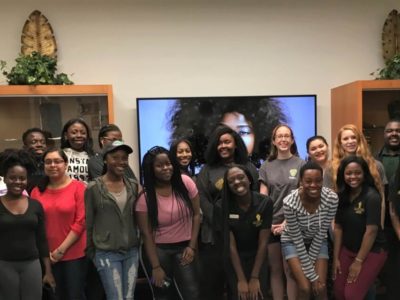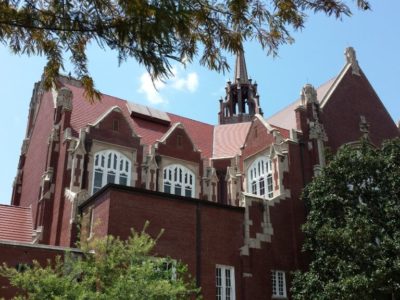Across the U.S., people celebrate Black History Month every February—in other words, American History. The University of Florida’s Black History Month (BHM) organization—an umbrella cabinet under the Black Student Union (BSU), collectively creates events throughout the month, including “Save Our Minds, Save Our Lives.”

This event educated participants about mental illness. It also engaged the general public on the topic and erased any misinformation and preconceived notions—all while entertaining all those who attended with a friendly, yet informative, scavenger hunt. The event took place last Wednesday night at the Reitz Union.
Dr. Rosa West kicked off the event with a presentation about mental health, welcoming all students, black or white.“As an African-American woman and a Mental Health Professional, I am deeply aware of the importance of health and well-being to the black community,” said Clinical Assistant Professor Dr. Rosa West. “Too often, mental health is considered secondary to physical health conditions and many are unaware of the significant impact mental illness can have on the overall health of an individual.”
Dr. West challenged all of us in the audience. She asked us to raise our hands if we knew someone suffering from a mental disorder. Many hands went up, but they slowly came down after her second question. She asked if we’d ever thought to encourage those we know are suffering to see a medical professional. And why, I wonder, did so many hands go down with all the resources across campus?
A scavenger hunt game followed. It showed the importance of the past and how it correlates to the present for African Americans. Statements spanning back into the past to explain the pathology of issues affecting the black community were made like, “Slaves who were diagnosed with Drapetomania were treated by being stripped naked and isolated in an unsanitary holding.” Players found statements like these to decide if they were fact or myth.
Although the statement is false, and slaves were not isolated (they were savagely whipped), doctors would diagnose blacks with a disease to explain their rebellious behavior in efforts to control them. This explains the generational mistrust built throughout centuries and a recurrence of misdiagnosis—due to a lack of cultural competence displayed by health care professionals.
“Save Our Minds, Save Our Lives” gathered people of all religious and racial backgrounds to discuss mental illness on a communal level. Though regarded a serious topic, mental health is often considered taboo within the black community. “It’s something that is just there and nobody wants to deal with it,” said freshman Amber Harvey. From a statistical standpoint, African Americans are 20 percent more likely to have psychological distress than whites—yet are less likely to seek and/or receive professional care.
The event was not white-bashing, instead it explained the root to a universal mindset many African Americans share in America. A friendly scavenger hunt sparked conversation and understanding across the board. “I thought it was a really good conversation starter. Especially within the black community, I didn’t really think about a lot of the things brought up—because I’m white,” said senior Sarah Probst. “It was interesting because it is a stigma in both communities and America in general. But definitely how [black] people sort of weighed in on the discussion about on [how] faith and financial issues affect their reasoning—yes, they are common but those reasons are more specific within the black community.”
Dr. West highlighted that misinformation and/or lack of education about the nature of mental health encourages its stigmatization within our community. “Some may view it as a weakness or failing because they have struggled to ‘push through’ as we are often conditioned to believe we must do,” said West. This again correlates back to slavery and how African Americans were enslaved with the excuse of being “superhuman.”
In the present, many of us grow up to believe that we can tough things out—that emotion is not something we must express, that our pain and issues make us weak. Of course, there are other factors such as demographics and beliefs that effect that mindset. But it is one many in attendance could relate to. “We make the erroneous assumption that mental illness is not a condition ‘we’ experience; rather this an issue that happens among other communities,” said West.
As the event came to a close and the winners received their prizes, I spoke with a few attendees who shared their lasting impression of the event:
“… mental illness is something common and shouldn’t be made fun of. People should know that there are resources available for them. Within the university, you have friends, even the Gator Wellness and some professors, some are willing to listen,” said sophomore Chelsey Vincent.
“I hope that people will tell how prevalent the issue is. We should be more aware of it. Education is something everyone should take from this event, in order to help someone, get help. Become educated on mental health,” said BHM’s Program Planner Director Meaghan Sapp.
Save your mind. Save your life. Keep your hand raised and get help for whoever may suffer in your life—whether that’s a friend, family member or you.



















